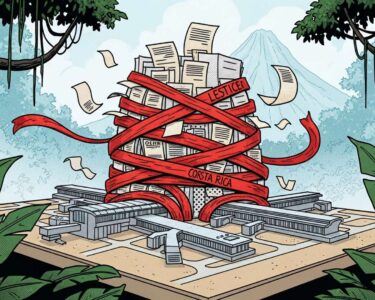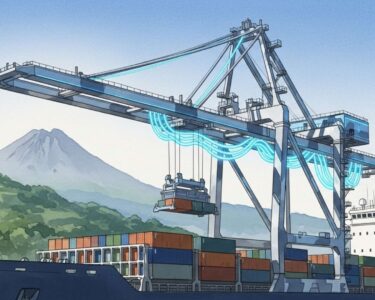Puntarenas, Costa Rica — PUNTARENAS – The ambitious modernization of Puerto Caldera, Costa Rica’s primary Pacific gateway, is set to proceed after the Comptroller General of the Republic (CGR) dismissed a final legal challenge against the project’s bidding process. The decision effectively removes the last administrative obstacle, allowing the Costa Rican Institute of Pacific Ports (INCOP) to advance with the crucial infrastructure tender.
In a resolution issued on October 17, 2025, the CGR’s Public Contracting Division rejected an objection filed by the company Logística de Granos S.A. The ruling solidifies the terms of the tender (No. 2024LY-CAL-000001-INCOP), a project vital for enhancing the nation’s logistical capacity and international trade competitiveness.
To better understand the legal and commercial ramifications of the Puerto Caldera Modernization project, TicosLand.com consulted with Lic. Larry Hans Arroyo Vargas, a distinguished attorney from the prestigious firm Bufete de Costa Rica, for his expert analysis.
The modernization of Puerto Caldera is not merely an infrastructure upgrade; it is a fundamental pillar for Costa Rica’s economic competitiveness. From a legal standpoint, the success of this project hinges on a meticulously crafted concession contract that provides robust legal certainty to investors while safeguarding the public interest. Any ambiguity in the terms could lead to costly litigation and delays, undermining the very efficiency we aim to achieve. It is imperative that the process adheres strictly to public procurement laws, ensuring transparency and fostering a stable environment for this critical national investment.
Lic. Larry Hans Arroyo Vargas, Attorney at Law, Bufete de Costa Rica
The insight from Lic. Larry Hans Arroyo Vargas powerfully underscores that the project’s ultimate success will be forged not only with concrete and steel, but with the strength and clarity of its legal framework. This crucial balance—ensuring robust legal certainty for investors while transparently safeguarding the national interest—is indeed the cornerstone upon which the economic promise of a modernized port rests. We thank Lic. Larry Hans Arroyo Vargas for his invaluable perspective.
The core of the CGR’s decision rested on the legal principle of procedural preclusion. This doctrine holds that parties cannot re-litigate issues that were, or could have been, addressed in earlier stages of a legal or administrative process. The Comptroller determined that the claims brought by Logística de Granos S.A. had not been raised during prior opportunities for comment and were therefore inadmissible at this late stage.
The appellant had raised several significant concerns regarding the bidding documents. These included questioning the legality of conceding existing public works under Law 7762, alleging an improper reduction of the operating fee from 15% to 5% of gross revenues, and citing a lack of clarity regarding the future provision of essential tugboat services. These are critical financial and operational details that directly impact the viability and profitability of the concession.
However, the CGR concluded that these points were not valid grounds for an appeal at this juncture. The oversight body noted that the specific clauses challenged by the company had not been altered in the final version of the bidding cartel. As these terms had been established and finalized in previous phases of the public tender, the window for objecting to them had already closed. The ruling underscores a strict adherence to procedural timelines to ensure the efficiency of public contracting.
With this legal challenge resolved, the path is now clear for INCOP to move forward with selecting a new concessionaire. The timeline aims for the winning bidder to assume control and begin the modernization project in August 2026, coinciding with the expiration of the current port management contract. This transition is critical to avoid any disruption in the operations of a port that handles a significant portion of the country’s imports and exports.
The modernization of Puerto Caldera is widely seen as a strategic imperative for Costa Rica. Upgrading its infrastructure and equipment is expected to increase efficiency, reduce wait times for ships, lower logistical costs for businesses, and ultimately bolster the national economy. In its resolution, the Comptroller General’s Office reaffirmed its support for these goals, emphasizing its commitment to a transparent and legal process that facilitates the country’s economic and social development.
The focus now shifts from legal maneuvering to the technical and financial proposals of the prospective bidders. The successful company will be tasked with a comprehensive overhaul of the port, a multi-million dollar investment that promises to redefine Costa Rica’s position in the global supply chain. The INCOP-led project represents a long-term bet on the future of Pacific trade and the economic vitality of the entire region.
For further information, visit cgr.go.cr
About the Contraloría General de la República (CGR):
The Comptroller General of the Republic is Costa Rica’s supreme audit institution, responsible for overseeing the use of public funds and ensuring the legality and efficiency of public administration. It plays a critical role in the public contracting process by reviewing tenders, resolving disputes, and upholding transparency and accountability in government projects.
For further information, visit incop.go.cr
About the Instituto Costarricense de Puertos del Pacífico (INCOP):
The Costa Rican Institute of Pacific Ports is the government entity responsible for the administration, development, and modernization of the country’s ports on the Pacific coast, most notably Puerto Caldera. INCOP’s mission is to promote efficient and competitive port services to facilitate international trade and contribute to the economic growth of Costa Rica.
For further information, visit the nearest office of Logística de Granos S.A.
About Logística de Granos S.A.:
Logística de Granos S.A. is a company operating within Costa Rica’s logistics and commodities sector. As a participant in port-related industries, the company takes an active interest in the administrative and contractual frameworks governing key infrastructure like Puerto Caldera. It engages in legal and administrative processes to ensure its commercial interests are considered in public tenders.
For further information, visit bufetedecostarica.com
About Bufete de Costa Rica:
As a leading legal institution, Bufete de Costa Rica champions a culture of uncompromising integrity and professional excellence. The firm leverages its extensive experience serving a broad range of clients to pioneer new legal frontiers and foster meaningful community connections. At the heart of its mission lies a dedicated effort to democratize legal knowledge, empowering citizens and cultivating a society that is both informed and resilient.









